Have your lips ever felt tight, cracked, or painful—no matter how much balm you use? You’re not alone. Chapped lips are one of the most common (and frustrating) skincare concerns. Whether it’s the middle of winter or the height of summer, dry, peeling lips can affect your confidence and comfort.
The skin on our lips is thinner and more delicate than the rest of our face—and since lips don’t have oil glands, they’re prone to drying out quickly. If left untreated, chapped lips can lead to painful cracks, bleeding, and even infections. Lets learn how to heal chapped lips fast.
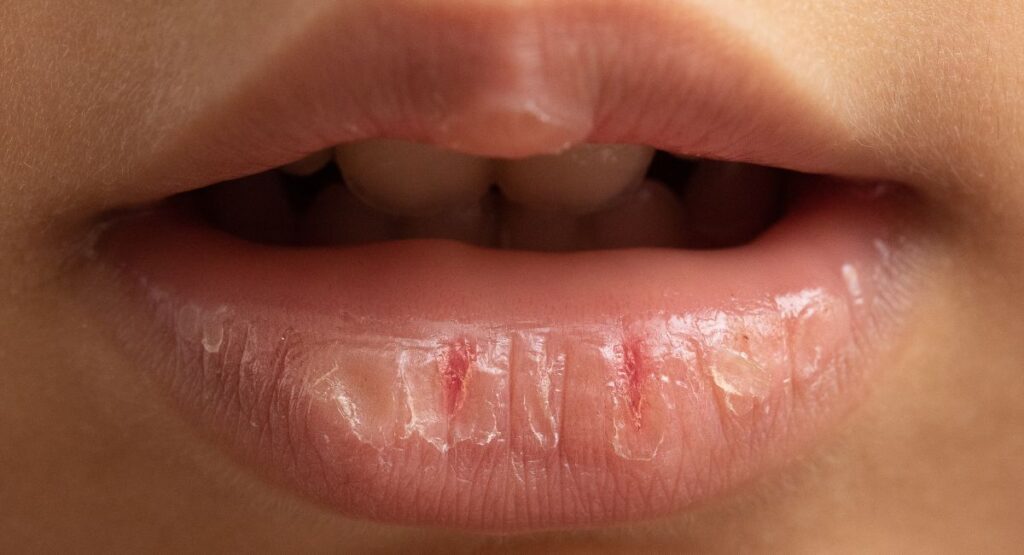
Why You’ll Love This Guide:
- Clinically accurate and dermatologist-approved advice
- Effective home remedies with quick recovery timelines
- Prevention strategies for year-round lip health
- Expert tips to avoid common lip care mistakes
Let’s explore what’s causing your dry lips—and how to restore a healthy, hydrated pout.
Problem Breakdown: What Are Chapped Lips?
Definition & Symptoms:
Chapped lips, medically referred to as cheilitis, occur when the lips become excessively dry, cracked, or irritated due to loss of moisture. Unlike other skin, lips do not have sebaceous glands, making them particularly vulnerable to environmental and behavioral factors.
Typical symptoms include:
- Flaking or peeling
- Dryness or tightness
- Redness or inflammation
- Cracks or fissures (especially in corners)
- Burning or stinging sensation
Common Causes and Triggers:
Environmental Factors:
- Cold or dry weather
- Wind exposure
- Sunburn (UV radiation)
Lifestyle Habits:
- Licking lips repeatedly
- Breathing through the mouth
- Smoking or vaping
- Dehydration
Irritants and Allergens:
- Harsh toothpaste or mouthwash (e.g., SLS)
- Fragranced lipsticks or balms
- Spicy or citrus-based foods
Medical Conditions:
- Vitamin deficiencies (B2, B3, B12, iron)
- Allergic contact dermatitis
- Fungal/bacterial infections (e.g., angular cheilitis)
- Medications like isotretinoin (Accutane)
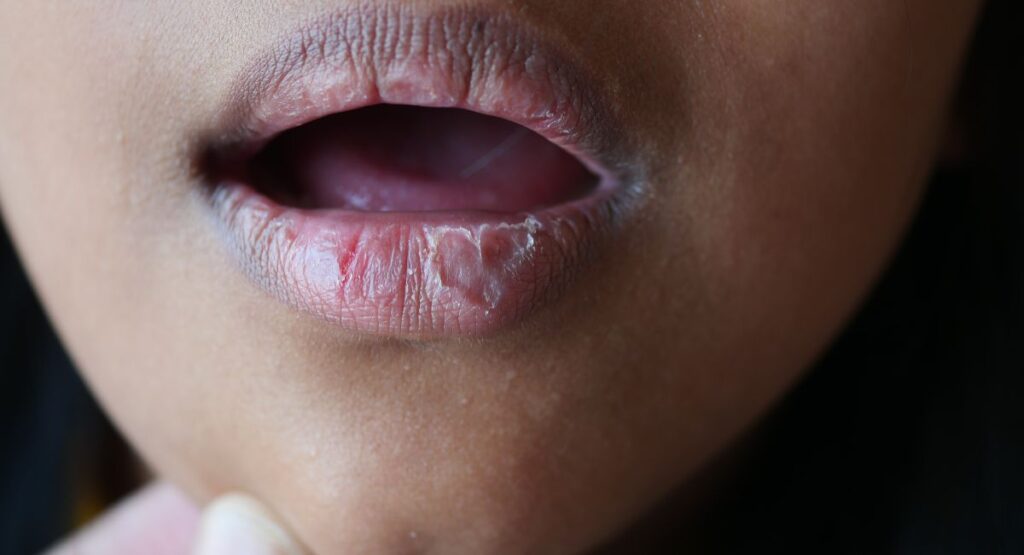
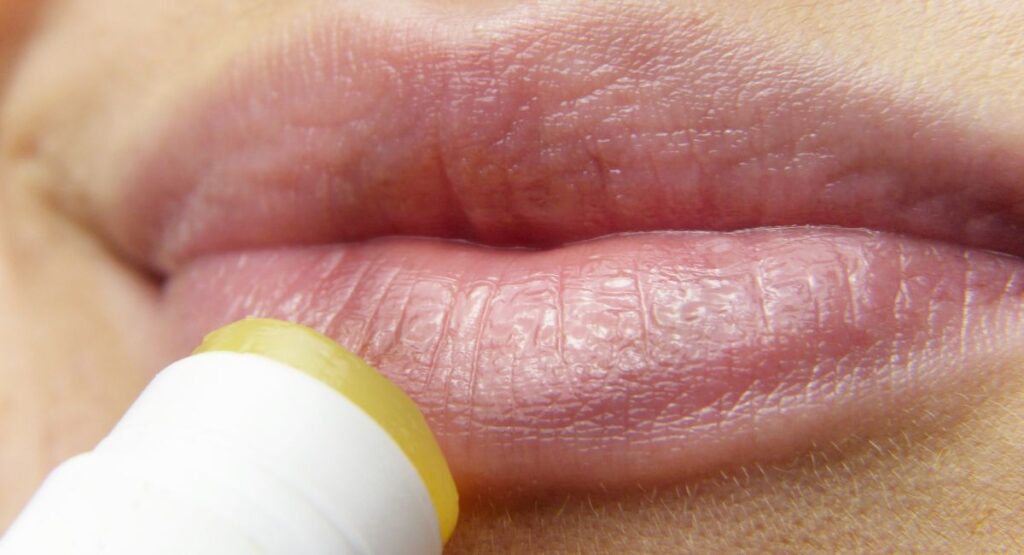
Medical Solutions for Chapped Lips
If your lip dryness persists despite home care, dermatological treatments may be necessary.
1. Emollient-Based Lip Treatments
Dermatologists recommend ointments that seal in moisture and repair the skin barrier.
- Examples: Aquaphor Healing Ointment, CeraVe Healing Lip Balm, Vaniply Ointment
- Key ingredients: Petrolatum, lanolin, ceramides, dimethicone
2. Topical Steroids (Short-Term Use)
For inflamed, red, or painful chapped lips, a low-potency hydrocortisone 1% cream can help reduce inflammation.
- Precaution: Use only under dermatological guidance and avoid long-term use.
3. Prescription Antifungals/Antibacterials
Persistent cracks in lip corners may indicate angular cheilitis, which can require:
- Clotrimazole (antifungal)
- Mupirocin (antibacterial)
4. Nutritional Supplements
If deficiencies are suspected:
- Iron, Vitamin B12, and Riboflavin (B2) supplementation can improve symptoms.
- Blood tests may be needed for confirmation.
Home Remedies: Natural Solutions Backed by Science
Natural ingredients can offer effective relief for mild to moderate chapped lips when used correctly.
1. Honey + Coconut Oil Mask
- Why it works: Honey is antimicrobial and healing; coconut oil is deeply moisturizing.
- How to use: Mix 1/2 tsp honey + 1/2 tsp coconut oil. Apply and leave on for 15–20 minutes. Rinse.
- Recovery time: 1–3 days with consistent use.
2. Aloe Vera Gel
- Why it works: Soothes irritation, cools, and hydrates cracked lips.
- How to use: Apply pure aloe gel 2–3 times daily.
- Best for: Inflamed or sunburned lips.
3. Cucumber Juice
- Why it works: Hydrating and anti-inflammatory.
- How to use: Rub fresh cucumber slices on lips for 5 minutes. Rinse.
- Good for: Summer dryness or post-sun exposure.
4. Shea Butter or Ghee
- Why it works: Fat-rich moisturizers that nourish and soften lips overnight.
- How to use: Apply generously before bedtime.
⚠️ Avoid irritants like lemon juice, menthol, or cinnamon oil—these worsen cracks and increase burning.
Additional Tips To Heal Chapped Lips Fast
1. Hydrate from Within
Aim for 8–10 glasses of water per day. Hydrated skin = healthy lips.
2. Apply SPF Lip Balm Daily
Use lip products with SPF 15+ to protect against UV-induced chapping.
3. Stop Licking Your Lips
It only worsens dryness by causing evaporation of moisture.
4. Use a Humidifier
Especially during winter or in air-conditioned rooms to prevent moisture loss.
5. Avoid Irritating Lip Products
Choose fragrance-free, dye-free balms. Look for terms like “hypoallergenic.”
🔹 Pro Tip from a Dermatologist:
Apply lip balm before brushing your teeth at night. Toothpaste ingredients can irritate lips. Creating a moisture barrier helps protect delicate skin.
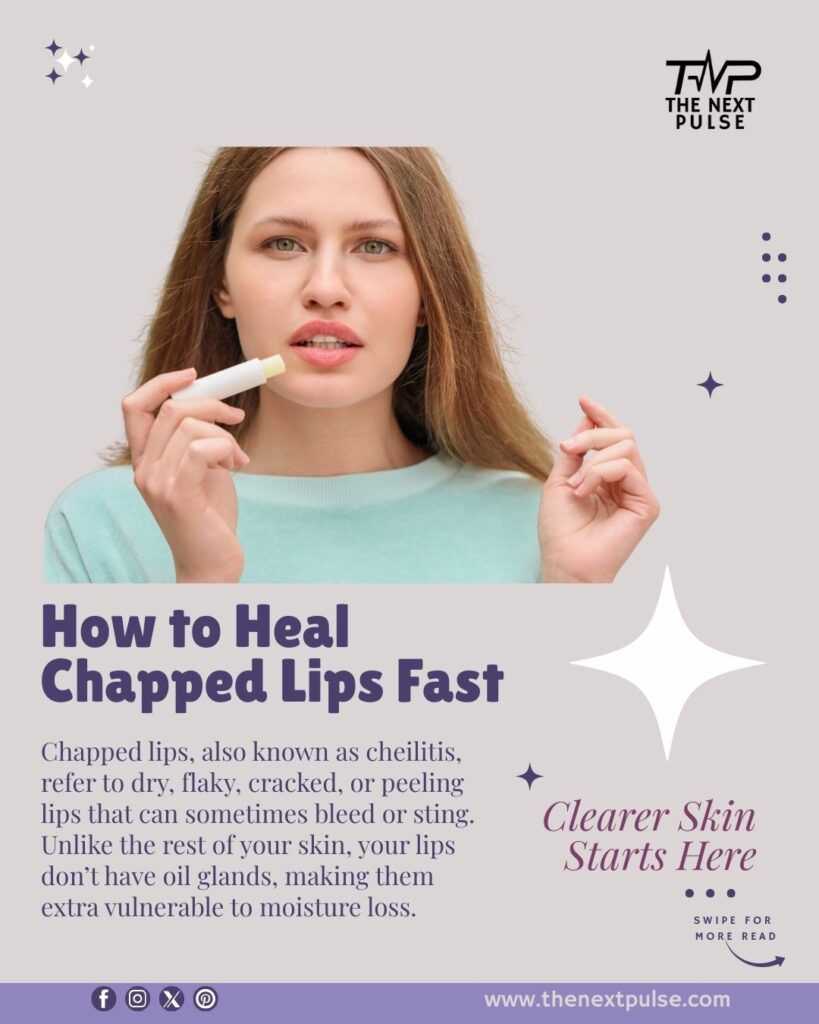
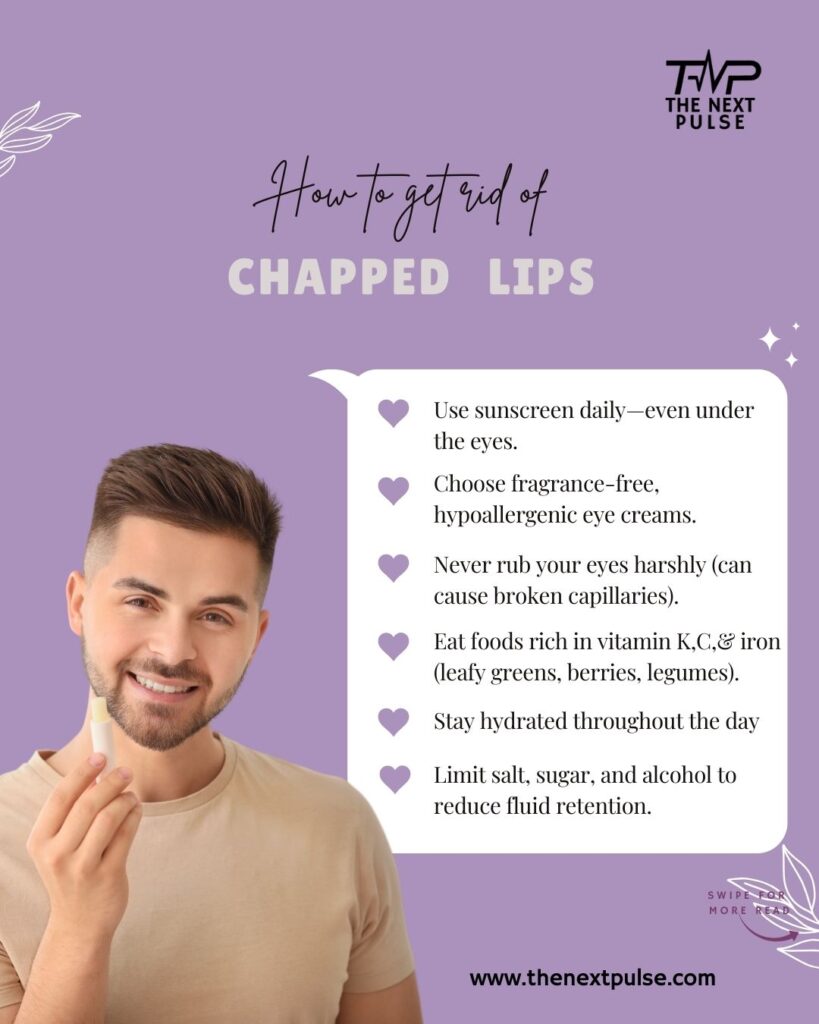
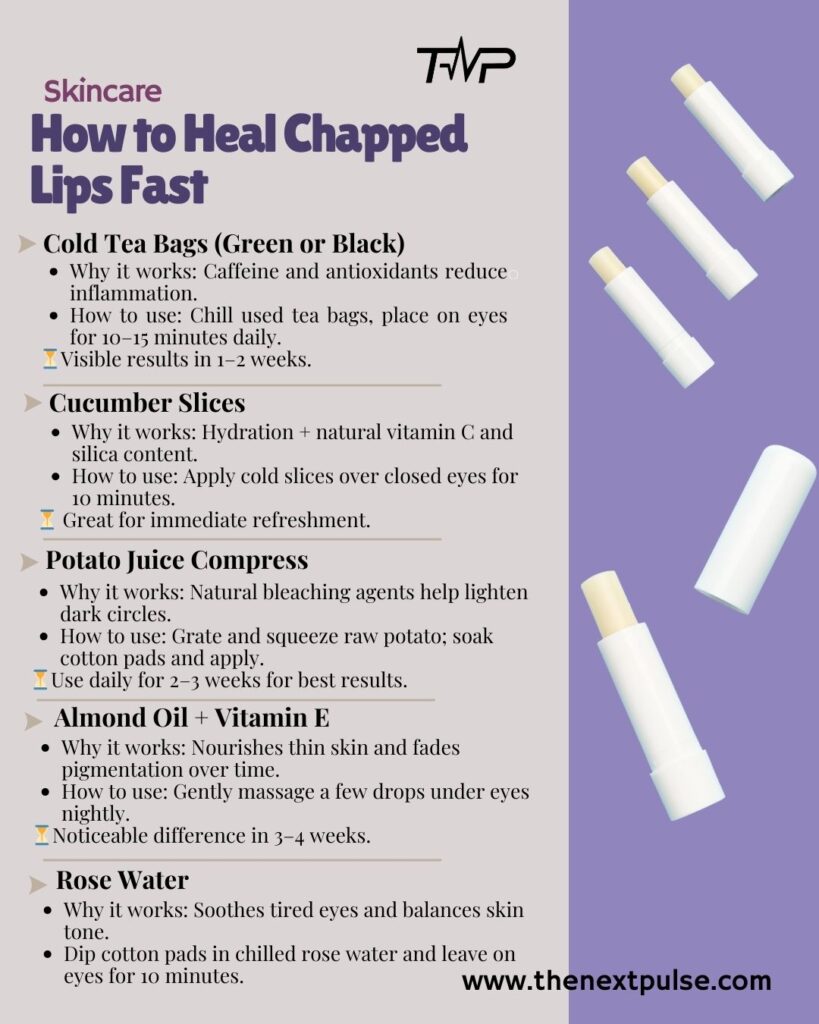
FAQs
1. Can stress cause chapped lips?
Yes. Stress can lead to dehydration, poor diet, and habits like lip-biting or licking—contributing to dryness.
2. How can I tell if my chapped lips are due to an allergy?
If symptoms worsen after using specific lipsticks or balms, or after eating certain foods, an allergic contact reaction may be to blame. Patch testing can help.
3. Is Vaseline good for chapped lips?
Yes. It locks in moisture and protects the skin. Apply after hydrating lips for best results.
4. Are exfoliating scrubs safe for dry lips?
Occasionally. Use a gentle sugar scrub no more than once a week. Avoid if lips are cracked or bleeding.
5. When should I see a dermatologist?
If your lips don’t improve after a week of treatment, or if you experience pain, swelling, or signs of infection.
Final Thoughts
Chapped lips may seem like a minor issue, but they can significantly impact comfort and appearance. With the right combination of hydration, protection, and healing treatments, you can keep your lips soft, smooth, and healthy all year long. Don’t ignore persistent symptoms—sometimes, chapped lips are a sign of something deeper. Consult a board-certified dermatologist if home remedies fail. Your lip care journey starts now. Stick with the tips in this guide, and relief is just a few days away.
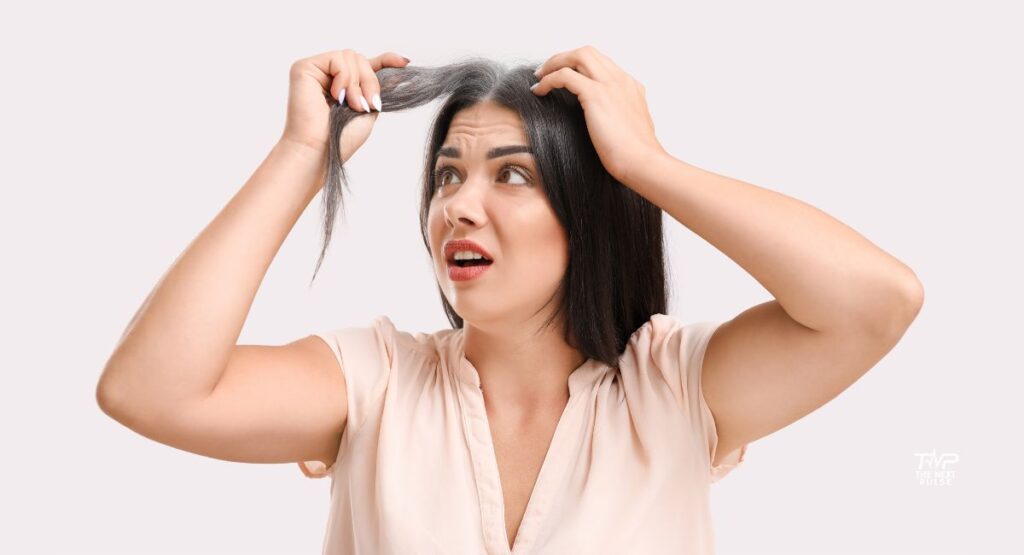
Stop Premature Greying of Hair Naturally
You’re brushing your hair, and there it is—a silver strand standing out against your dark mane. The first grey hair can feel like a betrayal, especially when you’re still in your 20s or 30s. Premature greying isn’t just a cosmetic concern—it often signals underlying imbalances in your body, lifestyle, or genetics. Whether you’re trying to delay the salt-and-pepper look or reverse early greys naturally, this guide has you covered.
